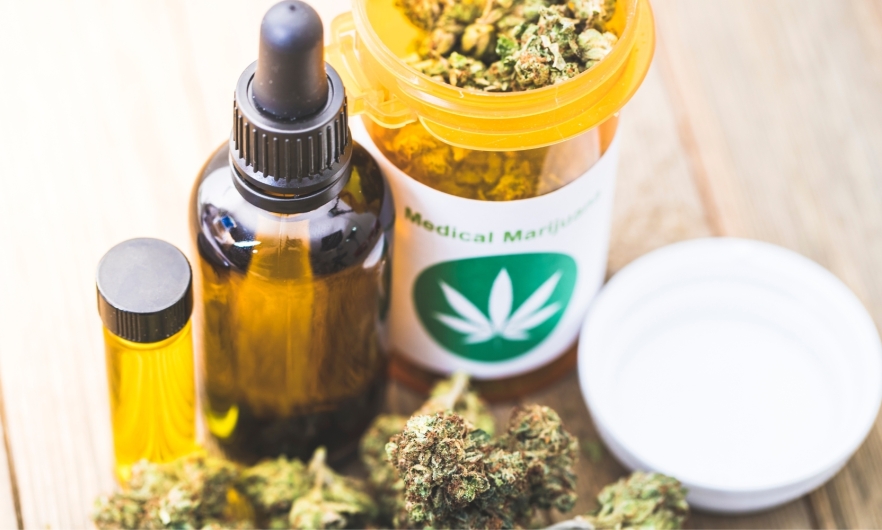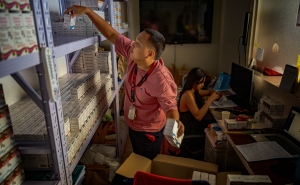The Evidence—and Lack Thereof—About Cannabis
Research is still needed on cannabis’s risks and benefits.

Although the use and possession of cannabis is illegal under federal law, medicinal and recreational cannabis use has become increasingly widespread.
Thirty-eight states and Washington, D.C., have legalized medical cannabis, while 23 states and D.C. have legalized recreational use. Cannabis legalization has benefits, such as removing the product from the illegal market so it can be taxed and regulated, but science is still trying to catch up as social norms evolve and different products become available.
In this Q&A, adapted from the August 25 episode of Public Health On Call, Lindsay Smith Rogers talks with Johannes Thrul, PhD, MS, associate professor of Mental Health, about cannabis as medicine, potential risks involved with its use, and what research is showing about its safety and efficacy.
Do you think medicinal cannabis paved the way for legalization of recreational use?
The momentum has been clear for a few years now. California was the first to legalize it for medical reasons [in 1996]. Washington and Colorado were the first states to legalize recreational use back in 2012. You see one state after another changing their laws, and over time, you see a change in social norms. It's clear from the national surveys that people are becoming more and more in favor of cannabis legalization. That started with medical use, and has now continued into recreational use.
But there is a murky differentiation between medical and recreational cannabis. I think a lot of people are using cannabis to self-medicate. It's not like a medication you get prescribed for a very narrow symptom or a specific disease. Anyone with a medical cannabis prescription, or who meets the age limit for recreational cannabis, can purchase it. Then what they use it for is really all over the place—maybe because it makes them feel good, or because it helps them deal with certain symptoms, diseases, and disorders.
Does cannabis have viable medicinal uses?
The evidence is mixed at this point. There hasn’t been a lot of funding going into testing cannabis in a rigorous way. There is more evidence for certain indications than for others, like CBD for seizures—one of the first indications that cannabis was approved for. And THC has been used effectively for things like nausea and appetite for people with cancer.
There are other indications where the evidence is a lot more mixed. For example, pain—one of the main reasons that people report for using cannabis. When we talk to patients, they say cannabis improved their quality of life. In the big studies that have been done so far, there are some indications from animal models that cannabis might help [with pain]. When we look at human studies, it's very much a mixed bag.
And, when we say cannabis, in a way it's a misnomer because cannabis is so many things. We have different cannabinoids and different concentrations of different cannabinoids. The main cannabinoids that are being studied are THC and CBD, but there are dozens of other minor cannabinoids and terpenes in cannabis products, all of varying concentrations. And then you also have a lot of different routes of administration available. You can smoke, vape, take edibles, use tinctures and topicals. When you think about the explosion of all of the different combinations of different products and different routes of administration, it tells you how complicated it gets to study this in a rigorous way. You almost need a randomized trial for every single one of those and then for every single indication.
What do we know about the risks of marijuana use?
Cannabis use disorder is a legitimate disorder in the DSM. There are, unfortunately, a lot of people who develop a problematic use of cannabis. We know there are risks for mental health consequences. The evidence is probably the strongest that if you have a family history of psychosis or schizophrenia, using cannabis early in adolescence is not the best idea. We know cannabis can trigger psychotic symptoms and potentially longer lasting problems with psychosis and schizophrenia.
It is hard to study, because you also don't know if people are medicating early negative symptoms of schizophrenia. They wouldn't necessarily have a diagnosis yet, but maybe cannabis helps them to deal with negative symptoms, and then they develop psychosis. There is also some evidence that there could be something going on with the impact of cannabis on the developing brain that could prime you to be at greater risk of using other substances later down the road, or finding the use of other substances more reinforcing.
What benefits do you see to legalization?
When we look at the public health landscape and the effect of legislation, in this case legalization, one of the big benefits is taking cannabis out of the underground illegal market. Taking cannabis out of that particular space is a great idea. You're taking it out of the illegal market and giving it to legitimate businesses where there is going to be oversight and testing of products, so you know what you're getting. And these products undergo quality control and are labeled. Those labels so far are a bit variable, but at least we're getting there. If you're picking up cannabis at the street corner, you have no idea what's in it.
And we know that drug laws in general have been used to criminalize communities of color and minorities. Legalizing cannabis [can help] reduce the overpolicing of these populations.
What big questions about cannabis would you most like to see answered?
We know there are certain, most-often-mentioned conditions that people are already using medical cannabis for: pain, insomnia, anxiety, and PTSD. We really need to improve the evidence base for those. I think clinical trials for different cannabis products for those conditions are warranted.
Another question is, now that the states are getting more tax revenue from cannabis sales, what are they doing with that money? If you look at tobacco legislation, for example, certain states have required that those funds get used for research on those particular issues. To me, that would be a very good use of the tax revenue that is now coming in. We know, for example, that there’s a lot more tax revenue now that Maryland has legalized recreational use. Maryland could really step up here and help provide some of that evidence.
Are there studies looking into the risks you mentioned?
Large national studies are done every year or every other year to collect data, so we already have a pretty good sense of the prevalence of cannabis use disorder. Obviously, we'll keep tracking that to see if those numbers increase, for example, in states that are legalizing. But, you wouldn't necessarily expect to see an uptick in cannabis use disorder a month after legalization. The evidence from states that have legalized it has not demonstrated that we might all of a sudden see an increase in psychosis or in cannabis use disorder. This happens slowly over time with a change in social norms and availability, and potentially also with a change in marketing. And, with increasing use of an addictive substance, you will see over time a potential increase in problematic use and then also an increase in use disorder.
If you're interested in seeing if cannabis is right for you, is this something you can talk to your doctor about?
I think your mileage may vary there with how much your doctor is comfortable and knows about it. It's still relatively fringe. That will very much depend on who you talk to. But I think as providers and professionals, everybody needs to learn more about this, because patients are going to ask no matter what.
Lindsay Smith Rogers, MA, is the producer of the Public Health On Call podcast, an editor for Expert Insights, and the director of content strategy for the Johns Hopkins Bloomberg School of Public Health.
RELATED





